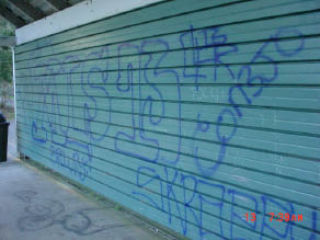Officials, residents examine ways
to control problem
Like an evil weed, graffiti keeps returning to H Street Northeast. It creeps up light poles, spreads on fences and buildings, appears wherever spraycan-and-marker-wielding vandals can work their mischief and vanish into shadows.
Ginny Anderson said vandals have hit some of her neighbors on H Street particularly hard, and despite everybody’s speedy efforts to undo the damage, the bad guys always strike back.
“It’s very frustrating,” Anderson said.
H Street is not the only victim: Public and private properties have been hit with equal intensity, increasing frequency and mounting expense.
Now, the machinery of city government is cranking up to give the police more tools to deal with this scourge.
The legal department is working on an early draft of an amendment to the current graffiti ordinance, borrowing from laws recently adopted by hard-hit cities such as Tacoma and especially Federal Way. Members of the city’s Municipal Services Committee will get their first look at the draft on June 9.
“We want to see what has worked and what has not worked before we bring to you the proposed amendment to the graffiti ordinance,” said Police Chief Jim Kelly.
Kelly said one wrinkle is that while Auburn police can arrest juvenile offenders, the King County Prosecutors Office decides whether to file charges. Most often, minor misdemeanor offenses are deferred to a local diversion committee for juveniles in Auburn. And if the offense is deferred to this committee, it is not a criminal conviction.
“The important thing is to eradicate graffiti, as quickly and legally as possible,” said Kelly.”
“On public property, the mayor’s directive has been very clear: he wants it taken care of the next day, and sometimes we can do that,” Kelly added. “Private property is more complex, and that’s where we are working on other solutions.”
In a phone interview, Federal Way City Manager Neal Beets said his City Council has taken the following steps in the last year and a half to deal with the problem:
• Reworked its ordinance to create a new category of offense, making possession of graffiti instruments illegal when coupled with circumstances indicating an intent to use them. This derives from the law that allows police to arrest a person in possession of auto theft tools.
“Say it’s 2 a.m., and there’s a kid with a backpack walking away from a fence that’s recently been graffitied. That gives an officer reasonable cause to detain the kid. If the kid is willing to open that backpack and paint or markers are found, that is an offense even if the officer didn’t see the kid literally do the graffiti,” Beets said.
• Spent $50,000 to buy a new generation graffiti-busting machine that uses water, silica, sand and air pressure to remove graffiti without harming the underlying wood or plastic surface.
• Provided resources to hire a part-time employee whose main responsibility is to patrol the city, find instances of graffiti and eradicate them. Federal Way’s policy directs that graffiti be removed within 24 hours.
“We can tell this is working by the fact that there is little re-occurrence,” Beets said. “Our experience is if it gets eradicated within 24 hours, it has the effect of discouraging the graffiti person. We see quite a bit less new graffiti if we just jump on it right away.”
Beets said he has no firm numbers to show who is doing the damage, but he estimates that 10-to-20 percent is associated with gangs marking their territory. The remaining 80 to 90 percent is kids with time to kill, apparently having little parental supervision and nothing better to do than deface property, he said.
“It was considerable a nuisance and it sent the wrong message to residents and visitors that perhaps we didn’t care about the appearance of our city,” Beets said.
Auburn Mayor Pete Lewis said the city should not adopt Federal Way’s program wholesale.
“Their problem is far more severe than ours is. Their problem is reduced, but it’s not gone,” Lewis said.
Committee Chair Gene Cerino said conversations with officials from Tacoma had assured him of one thing: enforcement only pushed the graffiti problem east and confounded Federal Way and Puyallup’s woes.
“The tougher Federal Way gets on graffiti, the more graffiti is going to show up in Auburn,” Cerino said.


